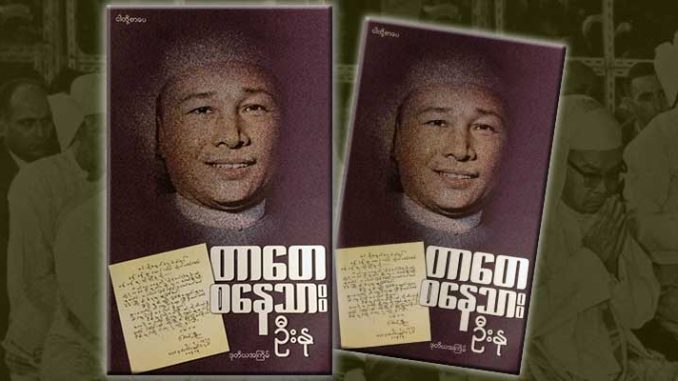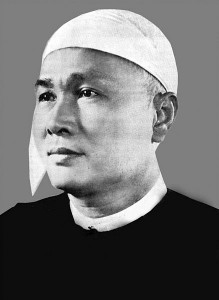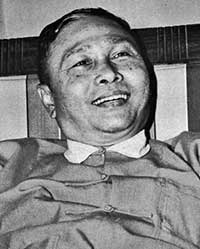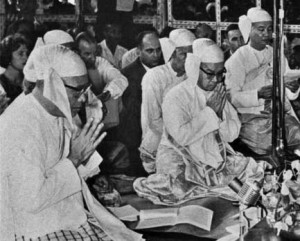
Tar Tei Sa Nay Thar (A child born on Saturday)
Nga Doe Sar Pay (Yangon, Myanmar), 2012.
The book is the autobiography of U Nu, a leading nationalist and political figure in 20th century Myanmar, and was originally written in 1969. It was first published in English in USA and India during 1969-1980, and in 1975, it was published in Burmese in India by Irrawaddy Publishing. It finally made print in Myanmar in September 2012 – right after the abolishment of media censorship by the Press Scrutiny and Registration Division under Ministry of Information. Since then, it has become a major bestseller in the country that led to a second printing in February 2013.
Despite being an autobiography, the book is a reflection on Myanmar’s customs, religion and the historical events of his days. U Nu, also known as Thakin Nu, was Myanmar’s first prime minister under the 1947 constitution of the Union of Burma, a position he held for eight consecutive years and his political life forms a major narrative in it. As the author, he originally wrote it as a personal memoir for his family and descendants. It is a chronological composition of the events detailing his life, starting from the day he was born. For this reason, one of the undercurrents in the book is the author’s desire to show how he tried to reform himself over the duration of his life. It is worth noting that there is a strong belief in Myanmar that a child born on Saturday (Tar Tei Sa Nay Thar) has an extremely bad character and, his/her parents can face potentially big problems along the life span, and this finds itself poignantly reflected in the title itself.

U Nu was born on 25 May 1907 to U San Tun and Daw Saw Khin. He was at first named as Maung Tun Min, but it was later changed to Maung Nu before he went to primary school, as his father believed, in line with customs in Myanmar, that changing one’s name is an important point of transition in life. The name “Maung Tun Min” (“Tun Min” vernacularly means ‘King appears’) may have contributed to his son’s bad behavior and changing it to “Maung Nu” (“Nu” means ‘gentle/soft’), would hopefully support his future life.
Nonetheless, U Nu noted countless examples of how he misbehaved as he grew up. In 1920, he participated in the first University Students Strike against British rule in Burma in which he noted how much he disliked how power was simply exercised to bully those who were in a weak position. In December 1921, he was involved in a peaceful strike against the Whyte committee which was set up by the British Colonial government and formed to investigate communal representation of the natives for the local parliament. In that strike, he threw a glass bottle at the ship that was carrying members of the committee and thus, was accused of obstructing them. In March 1922, he graduated from junior high school but became infamous among his friends as a womanizer due to a gonorrhea infection he picked up in 1923. This last event influenced his later life in the sense that he would try to control his sexual behavior. He also noted how after reading Cervante’s Don Quixote in 1924, he felt he shared many similarities with the protagonist in that he felt the urge to change his life: to not only to control his behavior, but also control his thoughts and speech.
He also noted that the turning point in his early adult life was in March 1926, when he failed on the IA (Intermediate in Arts) exam and with that, he became interested in his conserving dignity from a religious point of view. Noticing a change in him, his father offered guidance according to the teachings of Buddha. He finally passed the IA exam the following year and earned his B.A. in 1929 from Rangoon University.
Despite his desire to become a writer, U Nu soon enrolled on a LL.B. (Bachelor of Laws) program after graduation. However, three days after he started attending LL.B. course in May 1929, he was contacted by an uncle who invited him to visit Pantanaw, a town in the Ayeyarwady region, to become a local school teacher at a National High School. He took the job although he had no desire to become a school teacher at the age of 22. He noted how his stubborn character as a young man had caused him difficulties with the local education committee, but he managed to normally perform his teaching duties in class. It was during this time he met Ma Mya Yi, the sister of one of his best friends, whom he would later marry in 1931. In the autobiography, U Nu gave a detail description on how they met and started their family life together. In May 1933, he was appointed as the principal of the school. But, in 1934 he quit the job and resumed his LL.B. study, and it is a point that his political life began.
In 1935, he was elected as the president of the Rangoon University Students Union (RUSU). Not long after that, both U Nu and Aung San (the Editor of the union magazine ‘O-wai’) were expelled from the university after an article published in the union magazine. The article, “Hell Hound Turned Loose,” was considered defamatory by the university principal with whom U Nu had some issues. U Nu made clear how he disliked the requirement imposed on students to salute the university principal, professors and lectures as he thought it was not a custom of the Burmese people. Their expulsion from the university sparked off the second University Students Strike in February 1936 that forced the university to drop the case and readmit them. In 1937, U Nu and Aung San became the members of the nationalist organization, Dobama Asiayone (We Burmans Association) – and with that, U Nu was known as Thakin (“Master”) Nu. On one occasion in 1938, with other members of the association, U Nu managed to sing the association’s song entitled the “Dobama Asiayone Thichin” (We Burmese) in the student hostel in front of the other students.

U Nu’s strong desire for democracy for the nation and criticism of the dictatorship provide an important foundation for building liberty, equality and justice in a country that has been in disarray for decades.
All these facts relate to his early political life and are known among scholars of Myanmar’s history: they form the basis of interpretations of his formative years. Political life is indeed a major theme of the autobiography. U Nu details how he became interested in politics and then decided to become a politician, and what he did when he became the first prime minister of the young nation. In his political speech, he always said that: “In politics, don’t rely on arms, but just depend on public decisions!” (p.222). He clearly understood the importance of attending to the voices of the people rather than relying on political parties in the wielding of power. He brought the young nation together as one and also became the face of it in international fora during the early decades of the Cold War. U Nu also gives his frank opinions regarding political changes of the country after the coup in 1962. He mentioned that there were three types of enemies/opponents for democracy: (1) those in authority who are not willing to be accepted by the public, (2) those who are not, and never have been accepted by the public but rely on external elements and (3) those who have the arms and desire power (pp.355-356).

Besides dealing with aspects of his political life, the autobiography also reveals a different side of a man less known to the public. U Nu noted that he started to get interested in “Inn” (an esoteric religious belief system) as early as 1934; it is something he may have learnt about at an earlier stage in his life. He practiced this belief by reciting Parita suci (one of the important Buddhist ritual texts) and stated it was his preference over other rituals that used Buddhist prayer beads or observed eight or more Buddhist precepts. He firmly believed that this practice had completely changed his character and way of thinking. As such, he noted that when he was elected as prime minister he said to his colleagues that at first he would do it for only six months because he wanted to be a writer and to further practice the teaching of Buddha (p.215). During his service as prime minister, he claimed that he could gain self-control due to the teachings of Buddha.
Timely reading for the whole society of Myanmar
The autobiography is a timely reading for the whole society of Myanmar, especially for present day young people. Not only does it informs them about one of the great men the nation gave birth to, but it also inspires them to be courageous, despite some of the failures along the way, in hoping for a better future for the nation. U Nu’s strong desire for democracy for the nation and criticism of the dictatorship provide an important foundation for building liberty, equality and justice in a country that has been in disarray for decades. As such, this book may contribute to the political thinking of the current young generation who in the present climate of political transformation, can look back over modern Myanmar’s history to contextualize the changes taking place.
Reviewed by Nyein Chan
Ph.D. candidate at ASAFAS, Kyoto University
